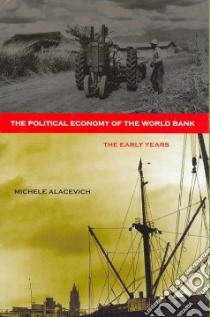- Libreria
- >
- Libri in lingua
- >
- Economia, finanza e management
- >
- Economia politica
The Political Economy of the World Bank - 9780821376478
Un libro in lingua di Michele Alacevich edito da World Bank, 2009
- € 29.40
- Il prezzo è variabile in funzione del cambio della valuta d’origine
This book is a fascinating study of economic history and history of economic thought. It narrates the history of the World Bank and the establishment of its role as leading development institution. The end of WWII was a crucial time: the reconstruction of Europe and the birth of the “third world” following decolonization, with the Cold War as a background, created a new need for development interventions and policies. The World Bank took over this challenging mission.The first general survey mission of the Bank to a developing nation – the Currie Mission – was in Colombia in 1949. It was a milestone for Colombia's postwar development and, for the Bank, a laboratory for the definition of policies for developing countries. With the Currie Mission as a starting point and a case study, the book analyzes the complexities of the Bank's first steps towards economic and social development in poorer nations, and helps the reader understand some foundational questions about development that are still of great relevance today. First, what is the intellectual basis, the foundation, of the Bank's activities? Paul Krugman has addressed this question referring to early intellectual debates, which he called “high development theory”. By revisiting this story through narrating the practice of development economics at the Bank using never-before used archival documents, Alacevich places these debates in an interesting new light. Second, what instruments could the Bank create to assist countries in their economic development? In its first years, the Bank decided to follow conservative financial policies. Only in the sixties, faced with growing disappointment within the development community, would the Bank adopt more inclusive lending policies such as social loans (e.g. housing, basic needs, health) and rejected the idea of social loans. The Bank maintained this position until the second half of the 1960s but was faced with a growing disappointment within the development community. Alacevich shows the reasons for this initial conservative approach.The lesson that can be drawn from this book is that the World Bank and the developing countries as they are today are the result of their history – a history of constant transformation and adjustment to the ever-changing challenges of development. History shows paths of development, and as such it should not be ignored by today's policymakers.
Informazioni bibliografiche
- Titolo del Libro in lingua: The Political Economy of the World Bank
- Sottotitolo: The Early Years
- Lingua: English
- Autore: Michele Alacevich
- Editore: World Bank
- Collana: World Bank (Paperback)
- Data di Pubblicazione: 19 Gennaio '09
- Genere: POLITICAL SCIENCE
- Pagine: 197
- Dimensioni mm: 228 x 152 x 19
- ISBN-10: 0821376470
- EAN-13: 9780821376478


